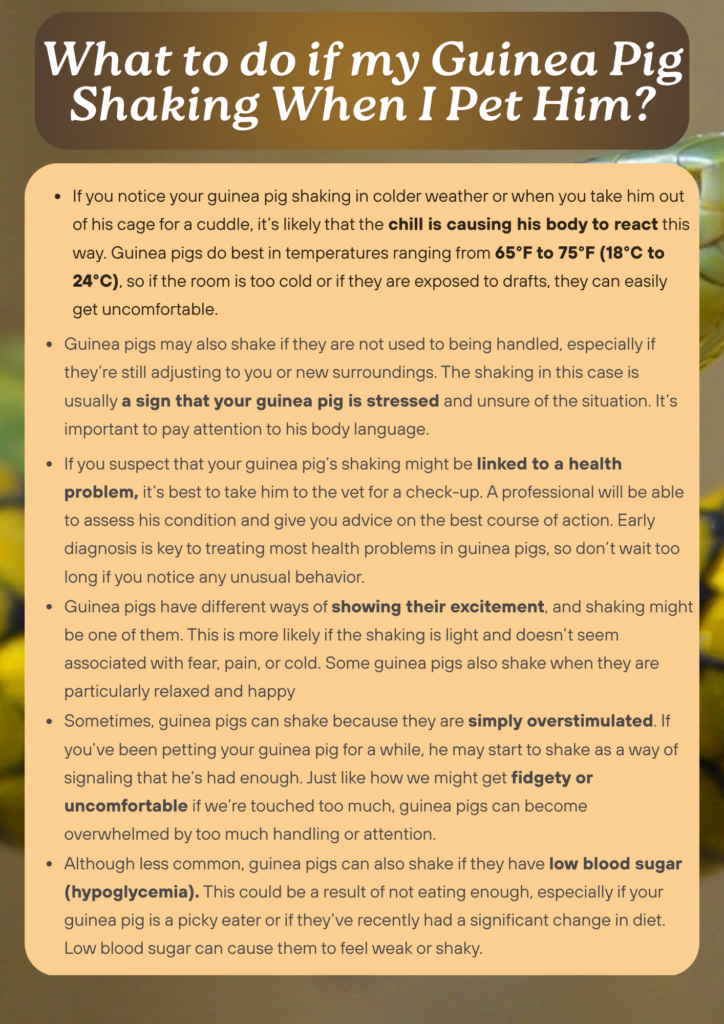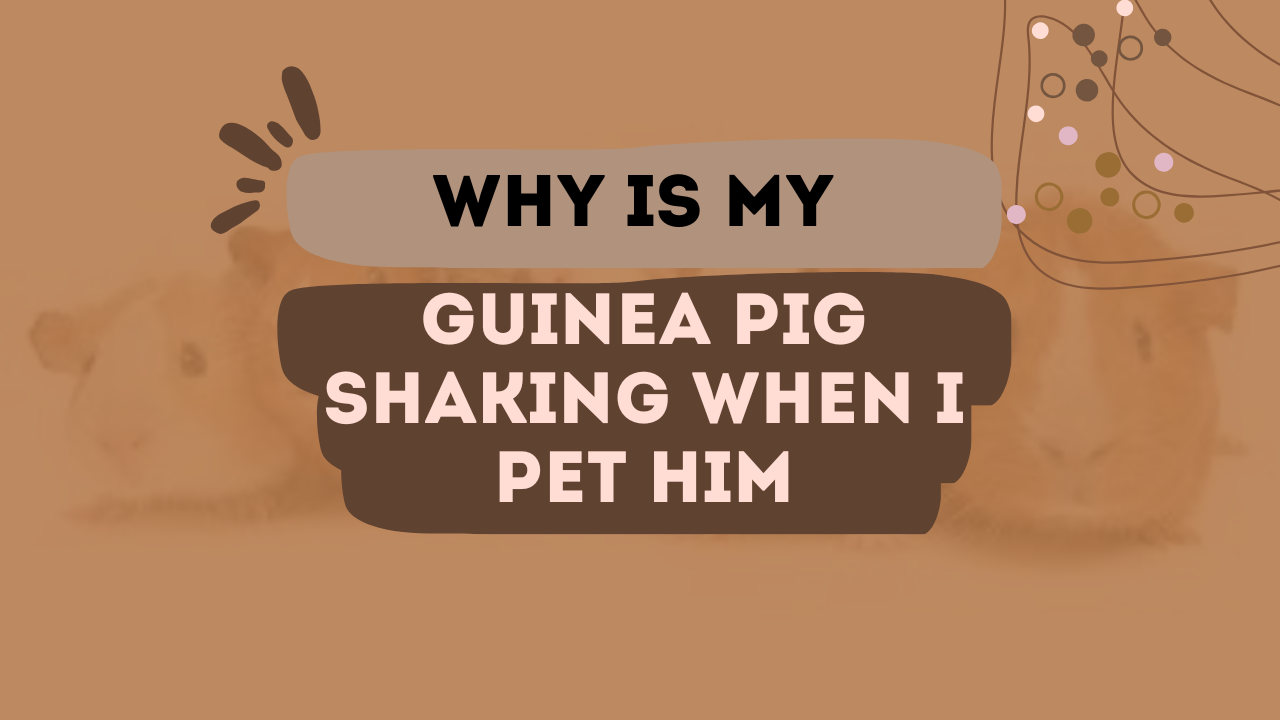Guinea pigs are incredibly cute little animals, known for their soft fur, twitchy noses, and sometimes, quirky behaviors. But what happens when you notice your guinea pig shaking when you pet him? It’s a question that many new guinea pig owners ask. Whether it’s just an occasional shiver or something that happens every time you show them some love, understanding the reasons behind this shaking can help you ensure your pet’s comfort and well-being.
In this article, we’ll explore some of the common reasons why your guinea pig might shake during petting, from feeling cold to experiencing stress or even health problems. So, if you’ve been wondering, “Why is my guinea pig shaking when I pet him?” — read on to learn more. Plus, we’ll talk about how you can help your guinea pig feel more relaxed and comfortable during your interactions.
Table of Contents

1. Feeling Cold
One of the most common reasons why a guinea pig might shake when you pet him is simply because he’s cold. Guinea pigs are quite sensitive to temperature changes, and their small bodies can get chilled quickly, especially if the room is drafty or the temperature is lower than what they’re used to. When guinea pigs get cold, they may shiver, much like we do, as a way of generating body heat.
If you notice your guinea pig shaking in colder weather or when you take him out of his cage for a cuddle, it’s likely that the chill is causing his body to react this way. Guinea pigs do best in temperatures ranging from 65°F to 75°F (18°C to 24°C), so if the room is too cold or if they are exposed to drafts, they can easily get uncomfortable.
To help your guinea pig, make sure his cage is in a warm, stable environment. You can even consider using a soft blanket or towel to help keep him cozy while you’re giving him attention. Avoid sudden temperature changes and make sure he has access to a warm, comfortable space.
2. Fear or Anxiety
Another reason your guinea pig might shake when you pet him is due to fear or anxiety. Guinea pigs, like many small animals, are prey creatures. They are naturally cautious and can get startled easily. If you are petting your guinea pig too quickly, too forcefully, or even in an area that he’s not comfortable with, he may start to shake from fear or anxiety.
Guinea pigs may also shake if they are not used to being handled, especially if they’re still adjusting to you or new surroundings. The shaking in this case is usually a sign that your guinea pig is stressed and unsure of the situation. It’s important to pay attention to his body language. If your guinea pig’s ears are flattened, he’s making little squeaky noises, or he seems to be trying to escape, it’s a good indication that he’s frightened.
To help your guinea pig feel more comfortable, take things slow. Let him come to you on his own terms, and avoid grabbing him suddenly or making loud noises around him. Gradually increase the amount of time you spend with him, and make sure to give him plenty of positive reinforcement — like treats — to help him associate petting with good things.
3. Health Issues or Pain
If your guinea pig is shaking and seems to be doing so more frequently or with more intensity than usual, there could be an underlying health issue at play. Guinea pigs may shake if they’re in pain, and there are a few common conditions that can cause discomfort or illness in guinea pigs.
For example, a guinea pig with bladder stones or an injury may shake as a response to pain. If your guinea pig is older, you should also be aware that arthritis can affect their joints, making them stiff and prone to discomfort. Respiratory infections or even gastrointestinal problems can also lead to shaking, though this is usually accompanied by other symptoms, like a lack of appetite or labored breathing.
If you suspect that your guinea pig’s shaking might be linked to a health problem, it’s best to take him to the vet for a check-up. A professional will be able to assess his condition and give you advice on the best course of action. Early diagnosis is key to treating most health problems in guinea pigs, so don’t wait too long if you notice any unusual behavior.
4. Excitement or Anticipation
Not all shaking is a cause for concern! Sometimes, guinea pigs shake because they’re excited or anticipating something fun. If your guinea pig starts to shake when you pet him, it could be his way of expressing excitement, especially if he enjoys being petted or if he’s expecting a treat.
Guinea pigs have different ways of showing their excitement, and shaking might be one of them. This is more likely if the shaking is light and doesn’t seem associated with fear, pain, or cold. Some guinea pigs also shake when they are particularly relaxed and happy, almost like a little wiggle that shows they’re in a good mood.
If your guinea pig is shaking in a way that seems to be linked to excitement, then there’s likely nothing to worry about. Keep an eye on his behavior and his other body language to make sure that he’s not displaying any signs of distress, and you’ll know if it’s just a cute little shake of joy.
5. Overstimulation
Sometimes, guinea pigs can shake because they are simply overstimulated. If you’ve been petting your guinea pig for a while, he may start to shake as a way of signaling that he’s had enough. Just like how we might get fidgety or uncomfortable if we’re touched too much, guinea pigs can become overwhelmed by too much handling or attention.
To avoid overstimulation, make sure to keep petting sessions short and take breaks in between. Pay attention to how your guinea pig reacts to different types of petting, and learn where he likes to be touched the most. Some guinea pigs enjoy gentle strokes on their backs, while others prefer head scratches. Every guinea pig is different, so it’s important to find a balance that works for both of you.
6. Hypoglycemia or Low Blood Sugar
Although less common, guinea pigs can also shake if they have low blood sugar (hypoglycemia). This could be a result of not eating enough, especially if your guinea pig is a picky eater or if they’ve recently had a significant change in diet. Low blood sugar can cause them to feel weak or shaky.
To prevent this, make sure your guinea pig always has access to fresh hay and vegetables, as these foods are essential to maintaining their energy levels. If you notice shaking along with other symptoms, such as lethargy or loss of appetite, consult with a vet immediately. It’s better to be safe and get a professional’s advice.
Final Thoughts
So, the next time you catch your guinea pig shaking when you pet him, don’t panic — but definitely take a moment to consider why it might be happening. It could be as simple as him being cold or excited, or it could be a sign of something more serious like health issues or stress. Understanding your guinea pig’s behavior, paying attention to his body language, and providing a comfortable environment are key steps in making sure your furry friend stays healthy and happy.
If you’re ever unsure or if the shaking continues or worsens, don’t hesitate to reach out to a vet for help. After all, guinea pigs rely on us to be their voice and make sure they feel safe and loved.

